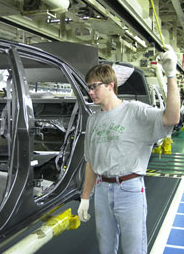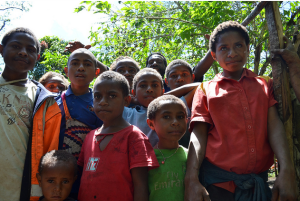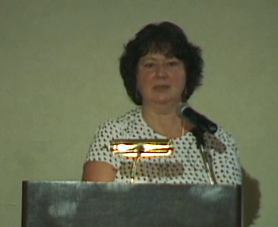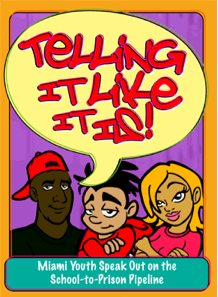News & Announcements
 Town Center, photo by Theodore Scott at Flickr Creative CommonsIIRP UK & Ireland present a one-day conference: "Putting Theory into Practice:
Town Center, photo by Theodore Scott at Flickr Creative CommonsIIRP UK & Ireland present a one-day conference: "Putting Theory into Practice:
The Restorative Way" in Swansea, Wales on November 29, 2012. Belinda Hopkins, of Transforming Conflict, writes on her blog:
"Our colleagues at the UK branch of the International Institute of Restorative Practices are branching out and organizing their first ever UK home-grown conference. They are having it in Swansea which has been making great headway spreading restorative practice across the city.
"CEO Les Davey, a friend and hugely respected colleague for many years, has kindly invited us to be there and share what we offer. Come along and join us there - support what Swansea is doing and continue to spread the word.
IIRP President Ted Wachtel will be visiting the Netherlands in early November. He will be leading "An Inspirational Presentation and Dialog" on the subject of "Building a Worldwide Restorative Practices Learning Network" in cooperation with Eigen Kracht Centrale and Restorative Justice Nederland.
Rob van Pagée and Hedda van Lieshout will present the vision of the independent organization Eigen Kracht Centrale, which asserts that citizens are uniquely able to deal with their own situation, by getting together with others directly affected, to discuss what is happening and to make a restorative plan for a solution.
Gert Jan Slump and Anneke van Hoek from Stichting Restorative Justice Nederland will reflect on “when worlds meet” — the potential for mutual learning created by Restorative Justice — when a crime brings together criminal justice professionals with offenders, victims and community members in a setting other than the courts.
Two videos from Michigan State University recently came to my attention. The videos demonstrate the use of restorative practices for responding to student conflict at the university, which has 16,000 students living on campus with a total of 40,000 students enrolled.
According to Rick Shafer, associate director of student life at MSU, for the past two years the university has increasingly used a variety of responsive restorative justice practices in a range of areas.
Said Shafer, "Primarily we are using it in residence halls to deal more reactively with reported conflict." The video below, "Student Voices," shows some great examples of this. A resident assistant discusses how she used a talking circle to work through an issue with residents who responded threateningly to her when she confronted them in a room about noise levels. In another case students offended about a large confederate flag displayed prominently in a residence hall talked through the issue with those who hung the flag to reach a satisfactory resolution. A third incident in the video involves a conflict between students from MSU and another university during an "alternative spring break" bus trip.
It's been a month or so, but I've been meaning to continue the series of posts about sessions I attended at IIRP's World Conference in August in Bethlehem, Pennsylvania. I'll continue with the one of three talks I attended on the subject of how restorative practices can apply in business and industry.
John Graham Macdonald offered a session entitled “Restoring Your Bottom Line: Using RP in Management.” Macdonald began by pointing out that old school thinking about management – based on rules and external motivations – simply do not work. He said that “intrinsic motivation,” on the other hand, does work well but it requires the right climate to really take hold.
Macdonald said, “People need as much autonomy as possible,” they “need opportunity to grow and do their best,” and he noted that people generally “want to belong.” Furthermore, he said that to really tap the potential of employees, the purpose (or perhaps mission) of the organization has to be one they can believe in. In other words, people really need to buy in – money is not enough. Macdonald emphasized the need of business organizations to identify shared values to provide foundation and purpose. He stressed that this is fundamental, and he even went so far as to define values as “things you’ll break rules and leave jobs for.”
 Photo of someone pulling an Andon Cord from NYTimes blog
Photo of someone pulling an Andon Cord from NYTimes blog
Jeffrey Farr, a 2012 IIRP graduate and English teacher at an alternative school using restorative practices, sent me a link to a piece titled "Case In Point: Avoiding Martial Arts Moves by Pulling the Andon Cord." In the subject heading of his email Farr wrote: "RP [restorative practices] by any other name would still be RP . . . " I like this idea of finding relevant connections and identifying practices that could be considered restorative wherever they may be found.
The piece talks about a mother using a sort of impromptu conference. She asks her sons, "What happened?" and then engages them in a process of what can be done to make things right.
I thought the piece was particularly interesting because it uses a metaphor from industry – "pulling the Andon cord," a procedure originating in Japan where factory line workers stop the production line to resolve a problem. The piece's authors, Elliott Weiss and Rebecca Goldberg, also reference "Continuous Improvement (CI)," an engineering and business term I recently heard about at IIRP's World Conference during a talk given by John Graham Macdonald of Hull, England titled “Restoring Your Bottom Line: Using RP in Management.” Macdonald said that CI is itself a restorative practice, because it's about engaging the whole company in continuing to improve their methods. At the same time, he believed that restorative practices as a whole could help businesses overcome institutional resistance to culture change, which CI does not itself address.
 photo from the highlands of Papua New Guinea by eGuide Travel at Flickr Creative Commons
photo from the highlands of Papua New Guinea by eGuide Travel at Flickr Creative Commons
A piece in the magazine Science titled “Turning from War to Peace in Papua New Guinea” (Vol. 337, September 28, 2012) by Elizabeth Culotta describes a recent anthropological paper co-authored by Polly Wiessner of the University of Salt Lake City, who has worked with and studied the Enga people of Papua New Guinea for 25 years, and Nitze Pupu, a blind Enga law school graduate. Wiessner and Pupu conducted more than 300 interviews to understand how the Enga have reduced violence, which was always present but shot up precipitously with the introduction of gun use in the 1990s.
Culotta writes: “The interviews highlight several factors that helped break the spiral of violence. First, people were tired and impoverished by war and felt that the damage wrought by violence was not worth the potential benefits. Second, once men had eschewed violence, Christianity offered them institutional support for their stance. Third, the brand of justice practiced in the village courts restored good relations among clans.”
 This week's video features Vidia Negrea, director of Community Service Foundation of Hungary, an IIRP international affiliate, delivery her full plenary at IIRP's 15th World Conference on August 2, 2012. The title of her talk was "Family Group Conferencing/Family Group Decision Making as a Transition from Prison in Hungary." Negrea begins by discussing her journey to introduce restorative practices in schools, social work and other areas, and then focuses on her work in prisons and how she has used restorative processes to help prisoners successfully return home after lengthy prison terms.
This week's video features Vidia Negrea, director of Community Service Foundation of Hungary, an IIRP international affiliate, delivery her full plenary at IIRP's 15th World Conference on August 2, 2012. The title of her talk was "Family Group Conferencing/Family Group Decision Making as a Transition from Prison in Hungary." Negrea begins by discussing her journey to introduce restorative practices in schools, social work and other areas, and then focuses on her work in prisons and how she has used restorative processes to help prisoners successfully return home after lengthy prison terms.
The 35-minute video can be viewed here.
A paper titled "Restorative Practices in Hungary: An Ex-prisoner Is Reintegrated into the Community" by Negrea offers a detailed case-study.
 Power U Center for Social Change is a nonprofit, grassroots organization based in Miami, Florida that, according to its web site, is "FIGHTING for our land, our people, our community; ORGANIZING for justice in our schools and communities; SUPPORTING the struggle of social, environmental, and economic justice." A key program area involves empowering youth to advocate for restorative justice in schools. Power U writes:
Power U Center for Social Change is a nonprofit, grassroots organization based in Miami, Florida that, according to its web site, is "FIGHTING for our land, our people, our community; ORGANIZING for justice in our schools and communities; SUPPORTING the struggle of social, environmental, and economic justice." A key program area involves empowering youth to advocate for restorative justice in schools. Power U writes:
In Miami, the majority of students arrested each year are Black, even though they only make up 27% of the student population. [An] unjustifiably broad and grossly unjust interpretation of zero tolerance policy on violence in schools has disrupted and interrupted education for so many students, and sent so many more on what is termed the "schoolhouse to jailhouse track"?, that approximately half of Miami's high school students fail to graduate.
Opinion: The mounting cost of violence - Rep. Mike Honda - POLITICO.com.
From the Wisconsin shooting to the war in Afghanistan, we all know that violence costs our society, whether it’s domestic violence, a homicide, a war, or something as simple as a security system. We also know that there are direct and indirect costs associated with violence, whether it’s the immediate medical, court and police costs that stem from violent crime, or the long-term loss of economic productivity that stems from the loss of an American worker’s life.
 Amy Merickel, a mother of a San Francisco school child, discovers the power of restorative practices when she volunteers as a recess monitor. She describes her experience in this podcast from KQED radio.
Amy Merickel, a mother of a San Francisco school child, discovers the power of restorative practices when she volunteers as a recess monitor. She describes her experience in this podcast from KQED radio.
I like where she says:
"It's [restorative practices] a framework for community building and conflict resolution, and is predicated on high expectations with high support to meet them. In education, Restorative Practices emphasizes building trusting relationships and learning from conflict. It helps put the kibosh on bullying."
The full text of her piece can be found here.
IIRP's involvement with San Francisco schools' implementation of restorative practices and other news about the impact RP is having on schools and in the city can be found here.
